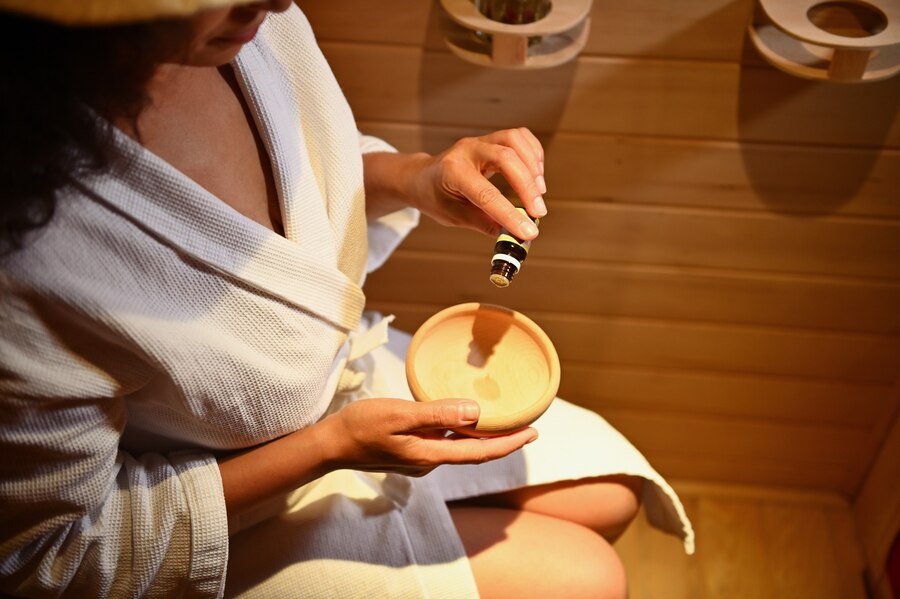
Aromatherapy, a holistic healing practice that utilizes the therapeutic properties of essential oils, has been practiced for thousands of years. With its increasing popularity in modern wellness culture, aromatherapy has become a go-to solution for those seeking effective methods of stress relief and relaxation. This natural remedy offers a wide range of benefits that can enhance emotional, mental, and physical well-being. In this article, we will explore how aromatherapy works for stress relief and relaxation, the essential oils commonly used, their benefits, and how to incorporate them into your daily routine. We will also provide insights into the science behind aromatherapy, share expert opinions, and answer frequently asked questions to give you a well-rounded understanding of this alternative therapy.
Understanding Aromatherapy: A Powerful Tool for Stress Relief
Aromatherapy is the practice of using essential oils extracted from plants, flowers, herbs, and trees to promote health and well-being. Essential oils are highly concentrated plant extracts that possess natural healing properties, such as antibacterial, antiviral, and anti-inflammatory effects. These oils are often used through inhalation or topical application, providing a wide range of therapeutic benefits that can significantly reduce stress, anxiety, and promote relaxation.
Stress, a pervasive problem in today’s fast-paced world, affects millions of people worldwide. Chronic stress can lead to various health issues such as high blood pressure, heart disease, and weakened immune function. Aromatherapy offers a natural way to alleviate these symptoms by promoting relaxation, improving mood, and reducing anxiety. Essential oils like lavender, chamomile, and bergamot are known for their calming properties, making them effective tools for stress management.
How Aromatherapy Works for Stress Relief
Aromatherapy works by stimulating the olfactory system, which is closely connected to the brain’s limbic system—the part of the brain responsible for emotions, behavior, and long-term memory. When you inhale the scent of essential oils, these volatile compounds travel through the nasal passages and are processed by the limbic system, triggering a response that affects your emotional and physical state. For example, inhaling the soothing scent of lavender can help calm the nervous system, slow the heart rate, and reduce feelings of anxiety.
Additionally, essential oils can be absorbed into the skin when applied topically. When diluted with a carrier oil, these oils penetrate the skin and interact with the body’s sensory receptors, further promoting relaxation and well-being. Research has shown that aromatherapy can significantly reduce levels of cortisol, the stress hormone, thereby lowering stress and anxiety.
Top Essential Oils for Stress Relief and Relaxation
Several essential oils are particularly known for their ability to reduce stress and promote relaxation. Below are some of the most popular essential oils used in aromatherapy for stress relief:
- Lavender Oil
Lavender essential oil is perhaps the most widely used oil for stress relief and relaxation. Its calming properties make it ideal for reducing anxiety and promoting a sense of peace. Studies have shown that lavender can help lower heart rate and blood pressure, making it an excellent choice for managing stress. Lavender oil is often used in diffusers, massage oils, and bath products. Source - Chamomile Oil
Chamomile oil, derived from the flowers of the chamomile plant, is another excellent choice for stress relief. Known for its anti-inflammatory and soothing properties, chamomile oil can help relax the body and mind, reduce irritability, and alleviate insomnia. It is often used in aromatherapy to calm nerves and promote restful sleep. Learn more - Bergamot Oil
Bergamot essential oil, extracted from the rind of the citrus fruit, is well-known for its mood-lifting and stress-reducing effects. Studies have demonstrated that bergamot oil can lower anxiety and elevate mood, making it an ideal choice for those dealing with stress, depression, or anxiety. It is often used in both diffusion and topical application for calming effects. Read more - Ylang-Ylang Oil
Ylang-ylang essential oil, derived from the flowers of the Cananga tree, is renowned for its relaxing and uplifting qualities. It can help reduce feelings of stress and anxiety, promote relaxation, and even balance emotions. Ylang-ylang is frequently used in aromatherapy blends to help relieve tension and promote relaxation. Source - Frankincense Oil
Frankincense, extracted from the resin of the Boswellia tree, has been used for centuries in both religious and healing practices. Frankincense oil is known for its grounding and centering properties, which help reduce stress and encourage relaxation. It is also believed to enhance meditation and spiritual practices. Learn more - Clary Sage Oil
Clary sage oil is often used for emotional well-being. Known for its balancing effects on hormones, clary sage helps reduce stress levels, alleviate anxiety, and enhance feelings of calmness. It can be particularly useful for women experiencing stress related to hormonal imbalances. Read about its benefits
Comparison: Popular Essential Oils for Stress Relief
| Essential Oil | Benefits | Ideal For | Usage |
|---|---|---|---|
| Lavender | Calms anxiety, promotes sleep, reduces stress | People with insomnia or anxiety | Diffuser, bath, massage oil |
| Chamomile | Soothes nerves, reduces irritability, promotes calm | General stress relief, relaxation | Diffuser, topical, bath |
| Bergamot | Elevates mood, reduces anxiety, promotes relaxation | Anxiety, mild depression, stress | Diffuser, topical |
| Ylang-Ylang | Reduces stress, boosts mood, emotional balance | General stress relief, relaxation | Diffuser, massage oil |
| Frankincense | Grounding, reduces stress, enhances meditation | Stress, anxiety, meditation | Diffuser, topical |
| Clary Sage | Relieves anxiety, hormonal balance, promotes calm | Women’s stress, anxiety, hormonal imbalance | Diffuser, massage oil |
How to Use Aromatherapy for Stress Relief
Aromatherapy can be easily incorporated into your daily routine using a variety of methods. Here are some popular ways to use essential oils for stress relief:
- Diffusing Essential Oils
One of the most common ways to experience the benefits of aromatherapy is by using a diffuser. Diffusers disperse essential oils into the air, allowing you to inhale their therapeutic properties. Simply add a few drops of your chosen essential oil to the diffuser, and let it work its magic to calm your mind and body. - Topical Application
Essential oils can be applied to the skin, but they should always be diluted with a carrier oil such as jojoba, coconut, or almond oil. Applying diluted essential oils to pulse points (such as the wrists, neck, and temples) allows the oils to be absorbed into the skin and provide stress-relieving effects. Be sure to perform a patch test first to ensure there are no adverse reactions. - Aromatherapy Bath
Adding a few drops of essential oil to your bath water can turn a relaxing soak into a therapeutic experience. The warm water helps to open your pores, allowing the essential oils to penetrate your skin, while the scent provides soothing effects. You can use lavender, chamomile, or eucalyptus oils for a calming bath experience. - Inhalation
Direct inhalation is another simple and effective method for stress relief. Place a few drops of essential oil on a handkerchief or cotton ball, then inhale deeply for a few minutes. This method is particularly useful for those on the go who need quick stress relief. - Massage
Combine your favorite essential oils with a carrier oil and gently massage it into your skin. Aromatherapy massage can relieve physical tension, improve circulation, and reduce stress. A massage therapist trained in aromatherapy can help you target specific areas of tension for even more relief.
Scientific Evidence Supporting Aromatherapy for Stress Relief
A growing body of research supports the benefits of aromatherapy for stress relief and relaxation. Numerous studies have explored how specific essential oils influence the brain and body, particularly in terms of reducing cortisol levels, improving mood, and promoting a sense of calm. Research published by the National Center for Complementary and Integrative Health highlights the effectiveness of essential oils like lavender and bergamot in reducing symptoms of anxiety and depression.
For example, a study published in the journal “Frontiers in Psychology” found that inhaling lavender essential oil can lower heart rate, blood pressure, and cortisol levels, all of which are indicators of reduced stress. Similarly, a study on the effects of bergamot oil on mood and anxiety demonstrated its ability to lower anxiety levels and improve overall mood, confirming its role as an effective tool for stress relief.
Frequently Asked Questions (FAQs) about Aromatherapy for Stress Relief
1. Can aromatherapy help with severe anxiety?
Aromatherapy can be helpful for mild to moderate anxiety, but for severe anxiety or panic disorders, it is important to consult with a healthcare professional. Essential oils such as lavender and bergamot have been shown to reduce anxiety symptoms, but they should be part of a broader treatment plan.
2. How often should I use aromatherapy for stress relief?
You can use aromatherapy daily as a preventive measure against stress or whenever you feel stressed or anxious. Using essential oils in a diffuser, bath, or massage routine can provide ongoing relaxation benefits.
3. Are there any side effects of using essential oils for stress relief?
When used properly, essential oils are generally safe. However, some people may experience skin irritation or allergic reactions, especially if the oils are not diluted. Always perform a patch test before using a new essential oil, and consult with a healthcare provider if you have any concerns.
4. What is the best essential oil for relaxation?
Lavender oil is often considered the best essential oil for relaxation due to its calming and soothing properties. Other oils like chamomile, ylang-ylang, and frankincense are also excellent choices for promoting relaxation.
5. Can I use aromatherapy if I have a medical condition?
If you have a medical condition, especially one related to the skin, respiratory system, or hormonal imbalances, it is advisable to consult a healthcare professional before using essential oils. Some oils may interact with medications or cause allergic reactions.
Conclusion: Embrace Aromatherapy for Stress Relief and Relaxation
Aromatherapy for stress relief and relaxation offers a natural and effective way to manage the pressures of modern life. With its ability to calm the mind, reduce anxiety, and promote a sense of well-being, aromatherapy is an invaluable tool in any wellness routine. Whether you are using it in the form of a diffuser, topical application, or massage, essential oils can provide much-needed relief from stress and tension. The growing body of scientific evidence supporting the therapeutic benefits of essential oils further solidifies their role as a complementary treatment for mental health and relaxation.
By incorporating aromatherapy into your daily life, you can enjoy its numerous benefits, enhance your emotional resilience, and achieve a greater sense of calm and relaxation. Choose the essential oils that resonate most with you, experiment with different methods of application, and make aromatherapy a cornerstone of your stress management practices. As we continue to explore natural ways to combat stress, aromatherapy stands out as a time-tested and effective solution for enhancing both physical and emotional well-being.









